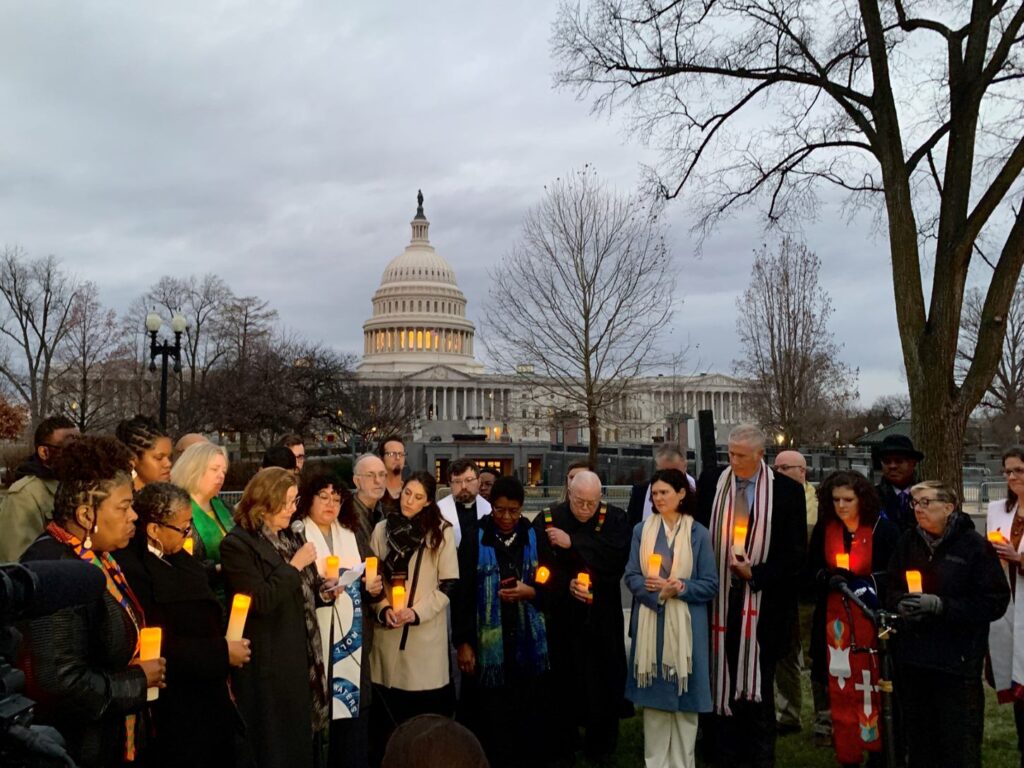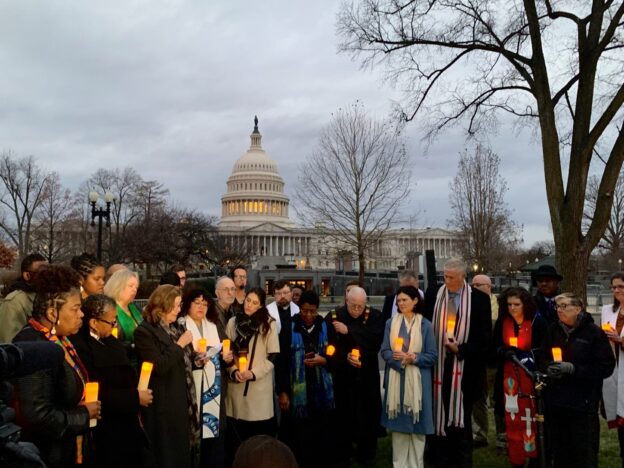
Relational Politics
Democracy’s Future Depends on Fostering Community
Mary J. Novak
April 12, 2023

Christian leaders gather across from the U.S. Capitol for a sunrise vigil organized by the Baptist Joint Committee for Religious Liberty and Faithful America, marking the second anniversary of the January 6 insurrection.
Early in the morning on Jan. 6 of this year, a diverse group of faith leaders from different Christian denominations gathered across from the U.S. Capitol for a sunrise prayer vigil. I spoke at this event, representing NETWORK and the concerns that many Catholics have for the future of the United States. We prayed together for our democracy, and it felt like a glimpse of the Beloved Community that our system of government is capable of fostering.
The challenge that faces all of us is that this group was not representative of the rhetoric and political movement currently claiming the mantle of “Christian” in U.S. politics. One of the results of the 2022 midterm elections has been the ascendancy of extremists in Congress who assert a nationalist brand of politics that is corrosive to our system of government. If anything is clear from the January 6 Committee hearings and other current signs, our democracy is not yet out of the woods.
Democracy is the container for all the social and political issues that our Catholic tradition so richly informs — the dignity of the human person, economic equity, the rights of workers. We work for them in a pluralistic context, always seeking to build up the common good. Democracy offers protections that policy alone cannot cover and which other systems and philosophies, like Christian nationalism and Catholic integralism, openly reject. These seek to ascribe some uniquely dominating role to Christianity in society and invariably end in oppression and violence. The protections of democracy have remarkably held us through these past years, and the midterm elections played out without violence, despite coming a year after the insurrection of January 2021. I believe this was possible precisely because people got involved, especially at the local level.
At NETWORK, our field is very engaged and active among the countless justice-seekers who have been awakened in the past six years. I see in them an opportunity to recapture a certain relationality in our politics that has been lost in recent decades, and some NETWORK Advocates Teams are already embracing this in moving ways. We cannot achieve lasting change without authentic investment in the human relationships that run through our government and our society. The Catholic Sisters who founded NETWORK believed in this model, and we have seen it start to re-emerge with a new generation of political activists, as was evident in the awe-inspiring turnout of Gen Z in the last election.
But what we need for the long haul is a true political movement that breaks through the polarization and moves us into a space where we can creatively imagine what our democracy needs to look like to meet people’s needs and truly respond to the signs of our times.
One of the real hazards of our politics, as pointed out by Rachel Kleinfeld and others, is that the very polarization and obstructionism that creates gridlock in our politics wears down people’s faith in our system of democracy over time, because they do not see it delivering for them. People need clean air, clean water, affordable housing, pathways to home ownership, protections against discrimination — things that the government can and has delivered for people in the past! And we have been fortunate that the Biden administration has been able to deliver in areas like infrastructure and pushing back a bit against trickle-down economic policy.
But so much remains to be done. Part of our democracy work is addressing spiraling wealth inequality, the stratospheric inequity in our society that keeps wealth out of reach for so many and concentrated in the hands of the few. The wealth divide works to severely undercut people’s belief in this democratic system, because they do not see it as fair, they see that it can be corrupted, and again, they do not think it can deliver for them.
Despite the peril of the present moment, so many people of goodwill are responding to the challenge. Are enough people unsettled? No, frankly. But in our frustration with the polarization and stagnation brought about by a small number of ideological extremists with access to way too much funding and power, we can look around and see that we are not alone. We even find community in that space. And as we continue to organize and unify our vision and work for lasting change, we find something to be hopeful about, which can ground us for the long haul.
Mary J. Novak is NETWORK’s Executive Director.







